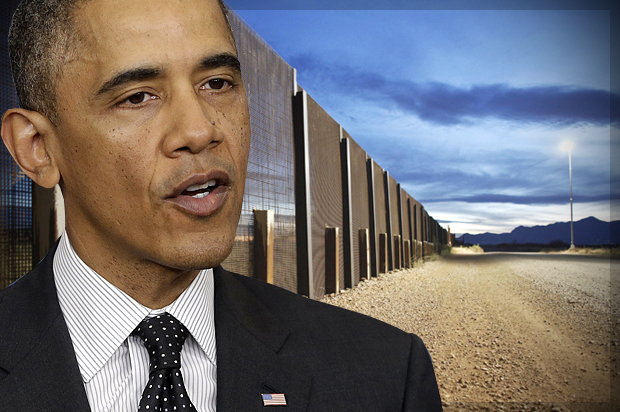I’ve watched President Obama’s explanation for why he’s delaying executive action on immigration until after the midterm elections several times now, and each time it gets worse. Chuck Todd posed a question to Obama on “Meet the Press” that assumed the decision was made to help retain Democratic control of the Senate, and Obama shot back: “Well, that’s not the reason.” And then he went on to explain that, yeah, the reason was pretty much entirely political.
“But here’s the other thing, Chuck,” Obama said, “and I’m being honest now, about the politics of it. This problem with unaccompanied children that we saw a couple weeks ago, where you had from Central America a surge of kids who are showing up at the border, got a lot of attention. And a lot of Americans started thinking, ‘We’ve got this immigration crisis on our hands.’”
That’s true! The policy and enforcement questions raised by the influx of Central American minors required clear explanations from the White House in order to preserve political support for executive action specifically and immigration reform more broadly. Those explanations never came. Instead, Obama maintained, the time for them is now – after the political problem has overtaken his policy agenda. “What I’m saying is that I’m going to act because it’s the right thing for the country,” Obama said. “But it’s going to be more sustainable and more effective if the public understands what the facts are on immigration, what we’ve done on unaccompanied children, and why it’s necessary.”
Vox’s Dara Lind points out that the administration’s yen for “explaining” immigration policy has thus far not translated into actual effective “explanations,” and as a result, they’re in a position where no one really trusts what they say:
Progressives and immigration advocates don’t believe that the administration has enough control over federal agents that it can tell them which immigrants not to deport — that’s why they’ve pushed for programs like DACA, in which immigrants can apply directly for protection. Republicans and conservatives flatly don’t believe that the Obama administration has any interest in enforcing immigration laws.
There are some people arguing that punting on immigration (again) was the smart political move for the White House, and the arguments aren’t without merit. Joshua Green points out at Bloomberg Businessweek that if Obama were to act and the Democrats were to lose the Senate, thick-headed pundits would be quick to link the two and “set back the cause” of immigration reform. That’s true in the sense that it could make already skittish Democrats even more nervous, though I’d point out that the cause remains hostage to the conservatives in the House and the leadership that can’t control them. Overall, I remain skeptical of the idea that action on immigration would “anger conservatives” or “reignite the issue,” since conservatives are already pretty angry and we already spent most of the summer talking about immigration.
But whatever the jittery Democratic campaigns in toss-up states told the White House was convincing enough, and the administration gave in to what Philip Bump called the “raw math” of the political situation: “In the states he — or, more accurately, his party, is most worried about this fall, taking action on immigration almost certainly wouldn’t be rewarded with more votes.”
Another factor in the White House’s political calculation has to be that no matter how mistreated or run-around Latino allies and/or voters may feel by Obama’s actions, the administration knows that they’re still in way better shape than the Republicans.
The Republican collapse among Latinos remains the far more consequential political story than any bumps the Obama administration has encountered over the last few years. The GOP share of the Latino vote in nationwide elections has been in steady decline ever since George W. Bush grabbed 44 percent (disputed) in 2004 and Fred Barnes pegged Latinos as the centerpiece to the “Republican hegemony in America” that “is now expected to last for years, maybe decades.” Congressional Republicans had a 68 percent disapproval rating among Latinos at the beginning of the summer, before they put the official kibosh on comprehensive immigration reform and voted with the nativists to end DACA. The only reason we’re having this discussion about executive action is because John Boehner, after making his own promise to draft and pass an immigration reform bill, did neither of those things. At this point the Republicans seem to be actively sabotaging their own reputations with Latinos.
So when the White House reneges on the promises they make to their Latino allies, they’re doing so with a fair amount of confidence that Latinos aren’t going to up and vote Republican. The frustration from activists on this point is fairly obvious, as no one likes being taken for granted. “We know where Republicans stand, and what this shows now is that Democrats are also willing to throw Latinos and immigrants under the bus,” Dream Action Coalition director Cesar Vargas told the Huffington Post.
Obama has said he’ll act after the election and, assuming he does, that will probably help to soothe some of the raw anger directed at the White House right now. But that doesn’t excuse the awful way they’ve handled this. The big danger for Obama and the Democrats, of course, is that instead of voting Republican, disaffected Latinos just won’t vote. Broken promises and mixed messages do tend to inspire political apathy, after all.

